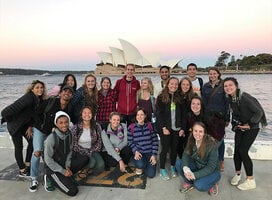Study Geography Abroad
From studying the composition of the ocean floor to learning how cultural elements can be tied to a specific region, geography is an incredibly diverse field of study. Without a doubt, there’s no better way to thoroughly examine the Earth and all its complexities than by going out and exploring the world yourself.
When you study geography overseas, you have the opportunity to encounter regional characteristics and cultures that you wouldn’t normally experience at home. Students of the discipline will be exposed to new natural environments, urban landscapes, and human systems, all of which will help to round out their education.
Other than the academic value, taking your studies overseas will help you acquire career-building skills, like to ability to adapt and function in unfamiliar territories. After all, in a field like geography, studying abroad will probably be just the start of many international adventures.
Overseas, geography majors will find an array of study abroad programs from which to choose. Common types include direct enrollment, fieldwork, research thesis, and real-world immersion.
Direct Enrollment
In direct enrollment programs, students will apply to and attend an overseas institution without going through an external provider. It’s a great option if you want to immerse yourself in the educational system of your host country and learn from sources you wouldn’t normally have at home. Geography majors will take regular classes alongside local students, working together under the guidance of top professors.
Field Work
How do your textbook notes hold up outside of the classroom? You’ll find out when you study geography overseas in a fieldwork program. You and your peers will observe international experts at work, usually through class trips or even global internships. Either way, you’ll experience firsthand how your knowledge of geography translates in actual scenarios.
Research Thesis
For geography students finishing out their degrees with a thesis, a semester overseas will greatly enhance the final product. From interviewing foreign specialists to observing how your sub-discipline operates in other parts of the world, the opportunities to expand your research are plentiful. Geography study abroad students are sure to cap off their academic career with a one of a kind project.
Real-World Immersion
Studying overseas, you can exercise cross-cultural communication skills while working towards a geography degree. In an immersive program, students will stay with a family and take classes in the local language. These types of programs are wonderful for students with a focus in human geography, though those simply looking for a firsthand approach to learning about other cultures will be equally interested.
Geography students will find an array of exciting programs around the globe, with the following regions serving as a sample of the top spots.
Singapore
If you’re a student of human geography, then perhaps there’s no better place to study overseas than in Singapore. Aspiring urban or economic geographers will have plenty to unpack in this flourishing city-state and world financial center. Plus, with unforgettable food experiences in hawker centers and unique spaces like Gardens by the Bay, students will love getting acquainted with Singapore in their spare time.
Australia
Physical geography majors will find Australia a wonderful place to take their studies. From studying coastal erosion to examining biogeographic regions, the country’s natural environment is a playground for geography students. On weekends and breaks, students will have their choice of exciting getaways, like road-tripping through the outback, snorkeling the Great Barrier Reef, or visiting Sydney Opera House.
Argentina
In Argentina, geography students will find the perfect blend of opportunities. Programs in Buenos Aires challenge cultural geography majors to examine politics and society, with internships sometimes available during the semester. Outside of the classroom, students can stroll through the capital city’s historic streets, experience Buenos Aires nightlife, or escape to Mendoza for wine and epic views of the Andes.
There’s more to know if you plan on studying geography overseas. This section will help you prepare for your international academic adventure.
How to Choose a Geography Study Abroad Program
For geography students, selecting the optimal overseas program depends largely on your sub-discipline and interests. Different parts of the globe will yield different opportunities to do fieldwork or research a specific subject matter. Australia is perfect for students with a focus in oceanography, while Hong Kong will be better suited for urban geography majors.
In addition to coursework, your interest in a potential host country is just as significant a factor when deciding on a program. Especially if you’re opting for a real-world immersion program, be bold when selecting your destination. Studying overseas is equal parts enhancing your academic studies and expanding your understanding of other cultures.
Health & Safety
While each country has its own health and safety considerations, there are a couple of universal trends to look out for. Crowded urban areas tend to host pickpockets or other petty thieves, while rural countrysides might expose visitors to foreign diseases. Your program will be able to advise you on the specifics of your destination.
If your research or classes take you in the field, you might face extra risks to health and safety. Your professors or supervisors will be well-versed in such policies, and, as such, pay close attention to their instruction.
Other Need to Know
While you’re packing up your suitcase, don’t forget to throw in an actual camera (disposables count!). Whether you’re the type to go monument hopping in Paris or hiking through a tropical rainforest in Costa Rica, taking pictures with your phone really isn’t the same when you’re traveling. Don’t be shy about recording every moment -- take as many “notes” when you’re out exploring as you would in the classroom.














